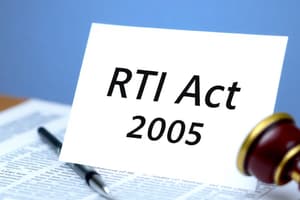Podcast
Questions and Answers
Explain the significance of the RTI Act 2005 in the context of the Indian constitution and government accountability?
Explain the significance of the RTI Act 2005 in the context of the Indian constitution and government accountability?
The RTI Act 2005 is significant as it allows every individual to seek and receive information related to any issue regardless of the boundaries, thus promoting transparency and accountability in the functioning of the central and state governments in India.
What are the main objectives of the RTI Act 2005 and how does it contribute to the UPSC exam preparation?
What are the main objectives of the RTI Act 2005 and how does it contribute to the UPSC exam preparation?
The main objectives of the RTI Act 2005 include providing citizens with access to records held by the government, promoting transparency, and ensuring accountability. Understanding this act is crucial for UPSC exam preparation as it is a key topic from both Prelims and Mains perspectives.
When was the RTI Act 2005 passed by the Indian parliament and when did it come into force?
When was the RTI Act 2005 passed by the Indian parliament and when did it come into force?
The RTI Act 2005 was passed by the Indian parliament in June 2005 and it came into force in October 2005.
How does the RTI Act 2005 align with Article 19(1)(a) of the Indian constitution?
How does the RTI Act 2005 align with Article 19(1)(a) of the Indian constitution?
What does the RTI Act 2005 provide for in terms of citizens' access to government records?
What does the RTI Act 2005 provide for in terms of citizens' access to government records?
What is the significance of the RTI Act 2005 in the Indian constitution?
What is the significance of the RTI Act 2005 in the Indian constitution?
What was the purpose of enacting the RTI Act 2005 by the Indian parliament?
What was the purpose of enacting the RTI Act 2005 by the Indian parliament?
What constitutional provision does the RTI Act 2005 align with?
What constitutional provision does the RTI Act 2005 align with?
When did the RTI Act 2005 come into force?
When did the RTI Act 2005 come into force?
What does the RTI Act 2005 aim to develop and ensure?
What does the RTI Act 2005 aim to develop and ensure?
Flashcards are hidden until you start studying
Study Notes
RTI UPSC Exam Prep
- RTI Act 2005 is a crucial topic for UPSC exam preparation in Prelims and Mains.
Features and Objectives
- The RTI Act 2005 allows every individual to seek and receive information related to any issue, regardless of boundaries.
- The act provides citizens with access to records held by the central and state governments.
- The objective is to develop and ensure accountability and transparency in line with Article 19(1)(a) of the constitution.
Important Dates
- The RTI Act was passed by the parliament in June 2005.
- The act came into force in October 2005.
Significance
- The RTI Act 2005 is a significant act introduced in the constitution of India.
- It provides a mechanism to ensure accountability and transparency.
Studying That Suits You
Use AI to generate personalized quizzes and flashcards to suit your learning preferences.


